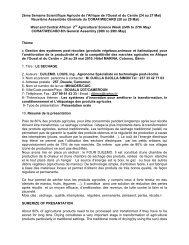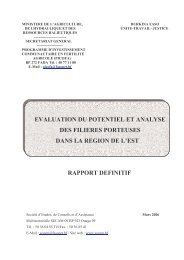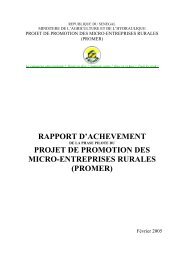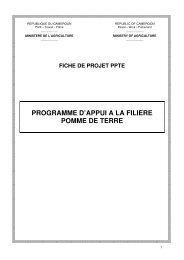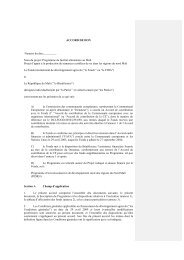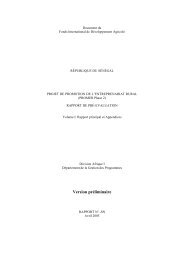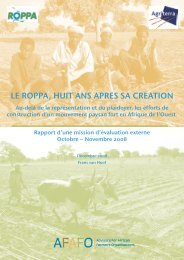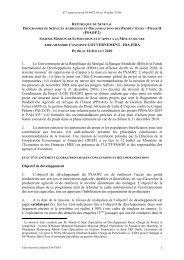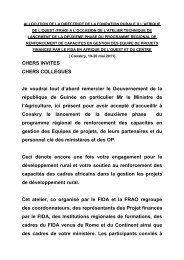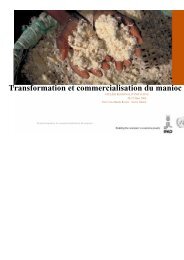Scaling Up the Fight Against Rural Poverty - FIDAfrique
Scaling Up the Fight Against Rural Poverty - FIDAfrique
Scaling Up the Fight Against Rural Poverty - FIDAfrique
You also want an ePaper? Increase the reach of your titles
YUMPU automatically turns print PDFs into web optimized ePapers that Google loves.
eports carry different names at different stages, <strong>the</strong> report outlines remain <strong>the</strong> same (see discussion<br />
below). There is thus one report format that drives project formulation, design and appraisal. For <strong>the</strong><br />
question, whe<strong>the</strong>r and how scaling up is addressed in <strong>the</strong> project design phase, <strong>the</strong> guidance documents<br />
for this report format are thus of particular importance.<br />
Six principles of engagement guide IFAD’s project design. These six principles of engagement are<br />
enunciated in IFAD’s Strategic Framework 2007-2010 (see Box 4). (IFAD 2007c) The fourth principle<br />
includes a reference to scaling up.<br />
Box 4: IFAD’s Six Principles of<br />
Engagement<br />
• Selectivity and focus of<br />
operations<br />
• Targeting of <strong>the</strong> poor and<br />
disadvantaged<br />
• Empowerment of poor rural<br />
people<br />
• Innovation, learning and scaling<br />
up<br />
• Effective partnership with<br />
national and international<br />
stakeholders<br />
• Sustainability of development<br />
Source: IFAD 2007c<br />
Box 5: IFAD’s Six Key Success Factors (KSFs)<br />
KSF1: Country relevance, commitment and<br />
partnerships<br />
KSF2: <strong>Poverty</strong>, social capital and targeting<br />
KSF3: Best practices and lessons learnt within <strong>the</strong><br />
context of IFAD´s Strategic Framework<br />
KSF4: Institutional aspects – identification and<br />
capacities and implementing agencies and partners<br />
KSF5: Risks and mitigation – complementing good<br />
design<br />
KSF6: Innovation, learning/scaling up and<br />
knowledge management<br />
Source: IFAD 2007c<br />
Of central importance to project design are <strong>the</strong> six Key Success Factors. They are listed in Box 5.<br />
These key success factors, and <strong>the</strong> specific questions that project documents have to address under<br />
each of <strong>the</strong> factors, play an essential role in guiding <strong>the</strong> design phase of IFAD projects. Originally<br />
scaling-up was not part of <strong>the</strong> KSFs. KSF6 referred to “Innovation, learning and knowledge<br />
management”, but not to “scaling-up”. Recently, KSF6 was revised to add “scaling up” (as shown in<br />
Box 5). This is encouraging. Going forward, however, <strong>the</strong> guidelines for project design and <strong>the</strong><br />
guidance questions for <strong>the</strong> Key Success Factors also need to be revised to address requirements for<br />
scaling up (institutional requirement, sustainability issues, monitoring and evaluation, targeting,<br />
implementation arrangements, best practices). Guiding questions need to be formulated that raise <strong>the</strong><br />
relevant issues for scaling up and best practise examples should be provided.<br />
Closely related is <strong>the</strong> important role that <strong>the</strong> Country Program Management Team (CPTM) and<br />
stakeholder engagement play in IFAD processes and activities. Active engagement of <strong>the</strong> entire CPTM<br />
and of stakeholders in <strong>the</strong> design of projects is deemed of great importance in IFAD. It is a core<br />
operating principle for IFAD to listen to national and local actors and to assign <strong>the</strong>m key roles in all<br />
activities conducted during <strong>the</strong> project cycle. For <strong>the</strong> project design phase, <strong>the</strong> start-up workshop,<br />
undertaken in-country early on before design work starts, is a well-established event which marks <strong>the</strong><br />
opening of virtually all IFAD projects. (IFAD 2006b) If IFAD wishes to help lay out pathways for<br />
scaling up, <strong>the</strong>n major issues that shape this pathway will need to be raised during this stakeholder<br />
workshop. As participants in stakeholder workshops are mostly from <strong>the</strong> country where <strong>the</strong><br />
programme is to be implemented, raising <strong>the</strong> scaling up questions will be important for creating<br />
awareness and sensitivity in country for <strong>the</strong> issues to be addressed to lay <strong>the</strong> pathway to scaling-up.<br />
31




